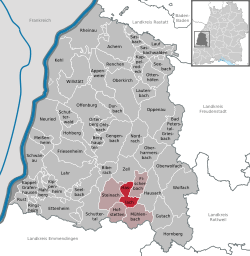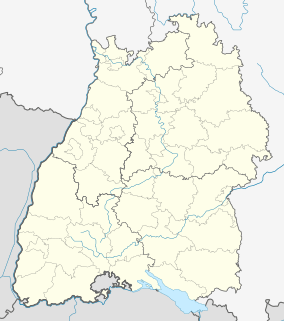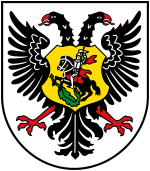Haslach im Kinzigtal
Haslach is a small city in south-west Germany, in the district Ortenaukreis, Baden-Württemberg. In 2010 it had a population of 7,010.
Haslach im Kinzigtal | |
|---|---|
 Coat of arms | |
Location of Haslach im Kinzigtal within Ortenaukreis district  | |
 Haslach im Kinzigtal  Haslach im Kinzigtal | |
| Coordinates: 48°16′40″N 08°05′13″E | |
| Country | Germany |
| State | Baden-Württemberg |
| Admin. region | Freiburg |
| District | Ortenaukreis |
| Government | |
| • Mayor | Heinz Winkler |
| Area | |
| • Total | 18.71 km2 (7.22 sq mi) |
| Elevation | 217 m (712 ft) |
| Population (2018-12-31)[1] | |
| • Total | 7,114 |
| • Density | 380/km2 (980/sq mi) |
| Time zone | CET/CEST (UTC+1/+2) |
| Postal codes | 77716 |
| Dialling codes | 07832 |
| Vehicle registration | OG |
| Website | www.haslach.de |
History
Roman Age finds (pottery shards, stone altar, Roman grave relief) indicate the presence of a settlement here at the time of the construction of a military road through the Kinzig valley (about 74 A.D.). Archaeological finds indicate a Roman road station. The founding of the city itself should be Zähringer in origin, Haslach was from the Zahringer in the 11th century as a market town and center of the local silver mining industry. This function experienced an enormous boost during the reign of Fürstenberg (first mention of the place in 1240), Haslach was the seat of a mountain judge, who administrated 400 tunnels and shafts of the Kinzig valley. Haslach 1241 was registered in the Hohenstaufen imperial tax list with the comparatively high amount of 40 marks of silver, the elevation in the status of a city took place in 1278.
After the decline of silver mining in the 16th century Haslach developed further as an official and market town. In the War of Spanish Succession, it was completely burned down in 1704. Oriented at the medieval town plan, the city then emerged relatively modern timber-framed buildings in southern-German, baroque Style.
During the last month of World War II Haslach had three sub-camps of the concentration camp Natzweiler-Struthof at the volcano near the city. Reason for the establishment of the camp was the relocation of production of several arms factories in the bombproof tunnels of the mine Hartsteinwerke volcano. In the camp about 1,700 prisoners from 19 countries under excruciating conditions were forced into hard labor. Hundreds of prisoners did not survive their stay there. Many French citizens were deported to this camp for their "crimes" against the Germany Reich. Among these prisoners was Alexis Dechaux, a Catholic priest, who was pastor of his church in Héricourt, France. In 1944, Walter Menzel of the Gestapo arrested Father Dechaux, who was eventually deported to the camp at Haslach, where he remained until being liberated in 1945. While there, he devoted his time to helping many unfortunate and dying camp prisoners by giving them spiritual comfort, smuggling in extra bread, and giving them solace and courage. He himself was tortured by the camp administration, made fun of because he wore his priestly cassock, and was marked for death more than once. However, due to his fortitude and strong will to live, he was able to survive the camp and return to his beloved parish where he was received with open arms and great fanfare.
The site of the former World War II underground factory at Haslach was used for an explosive seismic test in 1948.[2] In 1998 the "Memorial volcano" was dedicated in memory of this time.
Famous residents
- Heinrich Hansjakob (1837-1916), Catholic priest, politician and native writer
- Horst Prinzbach (1931-2012), chemist and emeritus professor of University of Lausanne and Albert-Ludwigs-University Freiburg
- Michael Geiger (born 1965), table tennis judge and functionary
- Martin Herrmann (born 1966), Chef, awarded two stars in the Michelin Guide
- Anita Schätzle (born 1981), wrestler and Olympian participant
Notes and references
- "Bevölkerung nach Nationalität und Geschlecht am 31. Dezember 2018". Statistisches Landesamt Baden-Württemberg (in German). July 2019.
- ""haslach seismic" Google search". Retrieved 2008-12-08.
